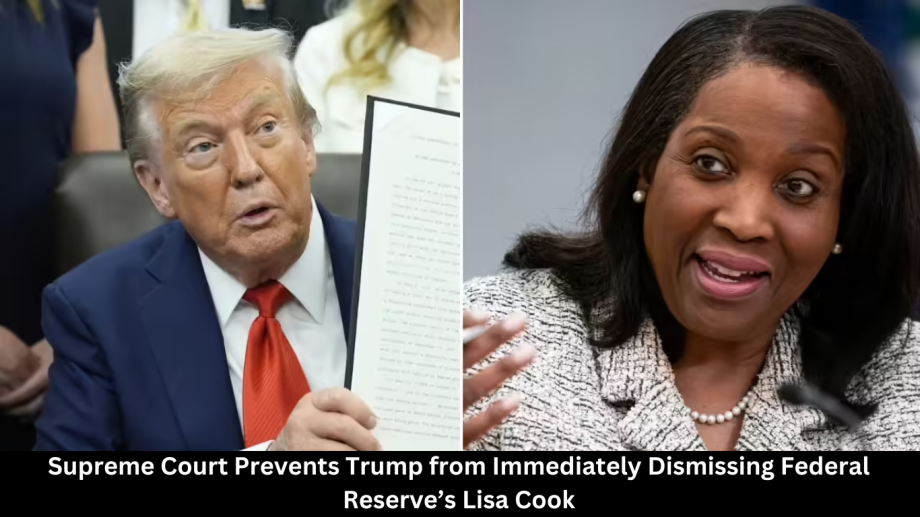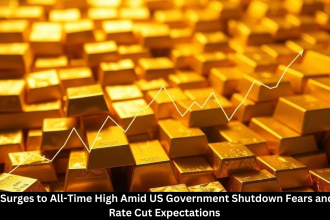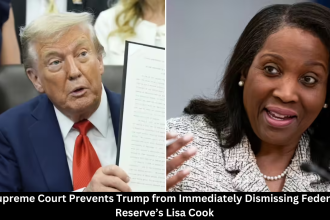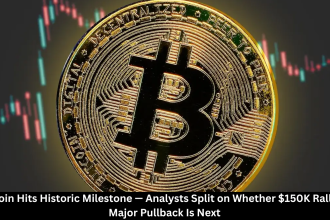In a landmark ruling that could reshape the balance between executive power and central bank independence, the U.S. Supreme Court has blocked President Donald Trump from immediately dismissing Federal Reserve Governor Lisa Cook.
- Who Is Lisa Cook?
- Why Trump Tried to Dismiss Lisa Cook
- Legal Background: The Federal Reserve’s Independence
- The Lower Court Rulings
- The Supreme Court Steps In
- Key Legal Questions Before the Supreme Court
- Market Reactions and Economic Implications
- Political Fallout
- Expert Opinions: A Clash Between Economics and Constitutional Law
- What Happens Next
- Historical Parallels
- Global Repercussions
- Frequently Asked Question
- What did the Supreme Court decide about Donald Trump and Lisa Cook?
- Why did President Trump want to fire Lisa Cook?
- What is Lisa Cook’s role at the Federal Reserve?
- Why is the case significant for the Federal Reserve’s independence?
- What are the legal arguments in this case?
- How have markets and economists reacted to the decision?
- What happens next in the Trump–Cook case?
- Conclusion
The decision, issued in early October 2025, underscores the judiciary’s role in defining the limits of presidential authority over independent economic institutions.
The case has drawn enormous attention from economists, legal scholars, and political analysts alike. It pits Trump’s renewed claims of executive control against decades of precedent designed to shield the Federal Reserve from political interference.
More Read: Bitcoin Hits Historic Milestone — Analysts Split on Whether $150K Rally or Major Pullback Is Next
Who Is Lisa Cook?
Lisa D. Cook, an accomplished economist and the first Black woman to serve on the Federal Reserve’s Board of Governors, was appointed by President Joe Biden and confirmed by the Senate in 2022.
Before joining the Fed, Cook held a distinguished academic career at Michigan State University and served on several White House economic advisory teams.
Cook’s research focuses on innovation, economic growth, and the long-term impact of racial and gender inequality. Her appointment was hailed as a historic step toward inclusivity and expertise in monetary policymaking.
Her tenure at the Fed, however, has become a flashpoint in the ongoing political struggle over the central bank’s independence.
Why Trump Tried to Dismiss Lisa Cook
After returning to the White House in 2025, President Donald Trump quickly moved to reshape the Federal Reserve.
Trump has long criticized the Fed for what he calls “politically motivated” interest rate decisions that, in his view, undermine economic growth and Republican fiscal policies.
According to administration sources, Trump’s legal team argued that the President should have the power to remove any federal official who “defies the elected executive’s policy agenda.”
Trump’s supporters claim that Fed governors wield enormous influence over the economy and that accountability to the President is necessary to restore “democratic control” over monetary policy.
Lisa Cook, known for her dovish stance on interest rates and her advocacy for equity-driven growth, was among the first officials Trump targeted for removal.
Her term, set to run until 2036, would have allowed her to serve well beyond Trump’s presidency—a situation that Trump’s legal team described as “untenable and unconstitutional.”
Legal Background: The Federal Reserve’s Independence
The Federal Reserve Act of 1913 created the central bank as an independent entity within the U.S. government.
While the President appoints members of the Board of Governors, each must be confirmed by the Senate and serves a 14-year term, deliberately designed to insulate monetary policy from short-term political pressure.
Federal Reserve governors can only be removed “for cause” — a legal phrase that traditionally means misconduct, neglect of duty, or inability to perform the job. This safeguard is meant to prevent presidents from firing governors simply for policy disagreements.
The Trump administration’s argument effectively challenged this insulation, contending that such statutory limits violate the Constitution’s Article II, which grants the President authority to “take care that the laws be faithfully executed.
” The White House cited recent Supreme Court decisions, including Seila Law v. Consumer Financial Protection Bureau (2020) and Collins v. Yellen (2021), where the Court struck down similar protections for agency heads.
The Lower Court Rulings
When Trump issued an executive order to remove Lisa Cook in August 2025, Cook immediately challenged the action in federal court.
Her legal team argued that the President’s order was unconstitutional, violating both the Federal Reserve Act and long-standing precedents protecting the independence of monetary authorities.
A federal district court in Washington, D.C., sided with Cook, issuing an injunction blocking her removal while the case proceeded.
The D.C. Circuit Court of Appeals later upheld the injunction, emphasizing that Congress deliberately designed the Fed to operate independently and that firing a governor for political reasons would undermine global confidence in the U.S. financial system.
The appellate court’s decision cited warnings from major economists, former Fed chairs, and financial institutions that politicizing the Fed could destabilize markets and trigger inflationary pressures.
The Supreme Court Steps In
The Trump administration appealed to the Supreme Court, requesting an emergency order to lift the injunction and allow the President to remove Cook immediately. However, in a 6–3 decision, the Court denied Trump’s request, allowing Cook to remain in her position until full arguments are heard early next year.
Chief Justice John Roberts and Justice Brett Kavanaugh joined the Court’s liberal justices in the majority, while Justices Thomas, Alito, and Gorsuch dissented.
The unsigned majority opinion emphasized the need to preserve institutional stability and prevent “irreversible harm” to the independence of the central bank pending full review.
“The Court recognizes the significant constitutional questions raised,” the opinion read, “but finds that the balance of equities and the public interest favor maintaining the status quo.”
Key Legal Questions Before the Supreme Court
The upcoming full hearing will likely revolve around three central questions:
-
Does the Constitution allow Congress to limit the President’s power to remove Federal Reserve governors?
Trump’s legal team argues that all executive officers serve at the President’s pleasure. Cook’s attorneys counter that the Fed is a quasi-independent entity with functions distinct from traditional executive agencies. -
Are monetary policy decisions inherently executive actions?
If they are, the President could have greater removal authority. If they are not, the Court may uphold Congress’s power to insulate the Fed from politics. -
Would allowing presidential removal authority destabilize financial markets or violate separation of powers?
Economists warn that even the perception of presidential influence could erode global confidence in U.S. economic governance.
Market Reactions and Economic Implications
Financial markets responded positively to the Supreme Court’s temporary injunction.
The Dow Jones Industrial Average rose 1.4% on the day of the decision, while the U.S. dollar strengthened modestly against major currencies. Analysts interpreted the ruling as a sign that the Fed’s independence remains intact—for now.
Had Trump succeeded in removing Cook, investors feared that it could open the door to a broader purge of the Federal Reserve Board, including potential pressure on Chair Jerome Powell, whose term expires in 2026.
Such moves could have undermined investor confidence and increased borrowing costs across global markets.
Economists from JPMorgan Chase, Goldman Sachs, and the Brookings Institution have warned that any erosion of Fed independence could fuel inflation and disrupt long-term price stability. “If monetary policy becomes a political tool,” one analyst noted, “the credibility of the U.S. dollar could suffer.”
Political Fallout
The ruling sparked intense political debate. Trump’s allies in Congress decried the decision as “judicial interference in executive governance.”
Senator J.D. Vance (R-Ohio) argued that the President should have authority over all executive officers, calling the injunction “a dangerous precedent.”
Democrats and some moderate Republicans, however, praised the Court for defending institutional checks and balances.
Senator Elizabeth Warren (D-Mass.) said the decision was a “victory for democracy and economic stability,” while former Fed Chair Janet Yellen called it “a critical reaffirmation of the Fed’s independence.”
Within the White House, the decision was reportedly met with frustration. Trump vowed to continue fighting the case, saying in a social media post:
“The Supreme Court is wrong to stop me from cleaning up Biden’s Federal Reserve. We need accountability for those destroying our economy.”
Expert Opinions: A Clash Between Economics and Constitutional Law
Legal scholars see this case as a potential defining moment for executive authority in the modern administrative state.
-
Harvard Law Professor Laurence Tribe remarked that “if the Court ultimately sides with Trump, it could erase a century of precedent protecting independent agencies.”
-
Former Solicitor General Neal Katyal said the Court’s interim decision shows “a cautious approach to an issue that touches every corner of the global economy.”
-
Monetary historian Liaquat Ahamed warned that politicizing the Federal Reserve “would replicate the mistakes of the 1970s, when political pressure led to runaway inflation.”
The case thus sits at the intersection of law, economics, and politics—a rare convergence that could determine how future presidents interact with independent institutions.
What Happens Next
The Supreme Court’s full hearing, scheduled for January 2026, is expected to be one of the most closely watched cases in decades.
If the Court ultimately sides with Trump, it could empower future presidents to dismiss Federal Reserve governors—and potentially other independent agency officials—at will.
If the Court upholds existing protections, it will reaffirm the legal foundation of the modern Federal Reserve and reinforce the principle that economic policymaking should be shielded from short-term political demands.
Either outcome will carry profound consequences:
-
For the Presidency: The ruling could redefine the boundaries of executive control over independent agencies.
-
For the Federal Reserve: It may determine whether the central bank remains politically insulated or becomes a more direct instrument of presidential policy.
-
For Global Markets: Investors will be watching closely, as the decision could affect interest rates, inflation expectations, and the global role of the U.S. dollar.
Historical Parallels
This is not the first time a president has clashed with the Federal Reserve. In the 1960s, President Lyndon Johnson pressured Fed Chair William McChesney Martin to keep rates low; in the 1970s, Richard Nixon famously strong-armed Arthur Burns into supporting expansionary policies before the 1972 election. But none of these disputes involved outright dismissal attempts.
By contrast, Trump’s move represents an unprecedented assertion of power—one that could fundamentally alter how the U.S. government manages its economy.
The situation also echoes the 1935 Supreme Court case Humphrey’s Executor v. United States, in which the Court ruled that Congress could protect independent agency officials from at-will removal. That precedent, long considered a cornerstone of administrative independence, now faces renewed scrutiny.
Global Repercussions
International observers have expressed concern that the U.S. could weaken the principle of central bank independence—a cornerstone of global economic stability.
The European Central Bank (ECB) and the Bank of Japan issued cautious statements reaffirming their own independence.
Analysts note that if the U.S. politicizes its central bank, it could undermine the credibility of similar institutions worldwide.
Emerging markets, which often look to the U.S. as a model of institutional strength, could experience capital flight or currency volatility if investors fear that monetary policy will be swayed by political cycles.
Frequently Asked Question
What did the Supreme Court decide about Donald Trump and Lisa Cook?
The U.S. Supreme Court ruled that President Donald Trump cannot immediately dismiss Federal Reserve Governor Lisa Cook while the case moves forward. The Court declined to lift a lower court injunction, meaning Cook will remain in her position until the justices hear full arguments in early 2026.
Why did President Trump want to fire Lisa Cook?
President Trump argued that the President should have full authority to remove any executive appointee, including Federal Reserve governors, who do not align with his policy goals. He claimed Cook’s monetary positions conflicted with his administration’s economic agenda and that her long term insulated her from democratic accountability.
What is Lisa Cook’s role at the Federal Reserve?
Lisa D. Cook is a member of the Federal Reserve Board of Governors, appointed by President Joe Biden in 2022. She plays a key role in shaping U.S. monetary policy, including decisions on interest rates, inflation control, and financial regulation. Her research focuses on innovation, economic growth, and equity in the economy.
Why is the case significant for the Federal Reserve’s independence?
This case could redefine the Federal Reserve’s independence from the White House. Since its creation in 1913, the Fed has been designed to operate without direct political interference. If the Court sides with Trump, future presidents could remove governors for political reasons—potentially undermining confidence in the central bank and destabilizing financial markets.
What are the legal arguments in this case?
Trump’s legal team argues that limits on presidential removal power violate Article II of the Constitution, which gives the President executive authority.
Lisa Cook’s lawyers counter that Congress intentionally protected Fed governors from political pressure to ensure stable, evidence-based economic policymaking. The dispute echoes past cases like Seila Law v. CFPB (2020) and Humphrey’s Executor v. U.S. (1935).
How have markets and economists reacted to the decision?
Financial markets largely welcomed the Supreme Court’s temporary ruling, viewing it as a reassurance of the Fed’s independence. Economists warned that allowing presidents to fire Fed governors could increase inflation risks, politicize interest rate decisions, and weaken global trust in the U.S. dollar.
What happens next in the Trump–Cook case?
The Supreme Court will hear full arguments in January 2026, with a final decision expected later that year. Until then, Lisa Cook will continue serving on the Board of Governors. The outcome could set a lasting precedent on whether presidents can remove officials from independent agencies like the Federal Reserve at will.
Conclusion
The Supreme Court’s decision to prevent President Trump from immediately dismissing Federal Reserve Governor Lisa Cook represents more than a procedural pause—it’s a defining moment in the ongoing struggle between executive authority and institutional independence.
At stake is not only the future of one central bank official but the credibility of the Federal Reserve itself, the stability of global markets, and the very principle that monetary policy must be insulated from political pressure.
As the nation awaits the Court’s final ruling, one thing is clear: the outcome will echo far beyond Washington, shaping how America governs its economy for decades to come.








